Translate this page into:
IAPCON 2020: Conference Proceedings
This is an open access journal, and articles are distributed under the terms of the Creative Commons Attribution-NonCommercial-ShareAlike 4.0 License, which allows others to remix, tweak, and build upon the work non-commercially, as long as appropriate credit is given and the new creations are licensed under the identical terms.
This article was originally published by Wolters Kluwer - Medknow and was migrated to Scientific Scholar after the change of Publisher.
INTRODUCTION
The 27th International conference of Indian Association of Palliative Care, IAPCON 2020 was held in February 14 to 16, 2020 in the city of Guwahati, Assam. Guwahati, the gateway to Northeast India, is the largest and the most cosmopolitan city in the region. Ruled for over 600 years by Ahoms, it was annexed by the Burmese and subsequently taken over by the East India Company. Dormant through much of the colonial period, Guwahati gained metropolitan prominence in the post-Independence era, especially after its southern district Dispur became the capital in 1973 replacing Shillong when Meghalaya, previously part of Assam, became a separate state.
Venue
IAPCON 2020 was organized in Gauhati Medical College Auditorium Complex. With a seating capacity of 1000 and adjacent lecture hall complex, the venue is situated in the heart of the city. It was most suitable for IAPCON 2020 as major medical institutions like Gauhati Medical College Hospital, State Cancer Institute and Dr. B. Barooah Cancer Institute are in the vicinity. The main aim of choosing this venue was to attract medical personnel, mainly students and young professionals, to understand and adopt the philosophy of Palliative Care and its integrative capacity.
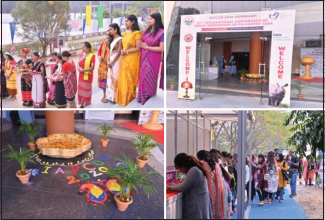
The theme
A challenge that is often mentioned in Palliative Care is that of insufficient palliative care literacy. This is specifically true when it comes to the essence of palliative care taking the patient & family in the core of care process where there is an involvement of non-medical people apart from the clinical team. This include not only volunteers but also those who may have an indirect contribution to patient care. For such people to believe in the philosophy of palliative care, it is vital that they be motivated not only to do the task but also pass it on to their peers. The theme of the conference, Entrust, Engage & Empower, was chosen with an intention to symbolize the power of Palliative Care as an inclusive specialty and, build up a force of not only the medical fraternity but also those who are contributing in all forms to patient care.
PRECONFERENCE WORKSHOPS
IAPCON 2020 held twelve Preconference Workshops on February 13 in venues chosen in and around the city in different institutions with an aim to promote palliative care advocacy and encourage local participation. The response was overwhelming and all of these institutions had generously sponsored the assigned workshops in all possible ways and means. It was heartening to see the eagerness of local coordinators who gladly coordinated the workshops in their respective venues. Premier institutions like University of Science & Technology, Meghalaya, Nemcare Super-specialty Hospital, GNRC Hospitals Ltd, Ayursundara Hospital, B Barooah Cancer Institute and State Cancer Institute came forward to host these workshops. The workshops conducted were on Spirituality, Qualitative Research Methodology, Psychology, Physiotherapy, and Humanitarian Issues among others.
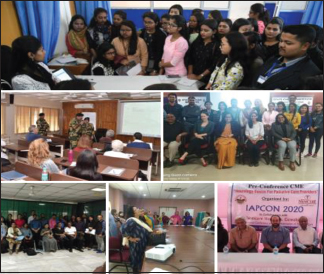
DAY-ONE ATTRACTIONS
Meet the expert
The proceedings of the conference kick started with oral presentations followed by interactive Meet the Expert sessions. These were based on three sub themes: ‘Achieving excellence in home care’ led by Dr Lulu Mathews and Dr Ravinder Mohan, ‘Empowering patients & caregivers’ led by Dr Anita Harish and Dr Sangeeta Goswami, and ‘Continuity of care’ led by Dr Mary Ann Muckaden and Dr Jumi Borgohain.
Plenary
Plenaries on Day-1 had two sub-themes: ‘Palliative Care Education in India’ and ‘Political will for prevention of relief and suffering at the end of life'. Three topics on Palliative care education were presented: ‘Palliative Care and the Next Generation’ by Dr Mhoira Leng in which she depicted the importance of inspiring the young generation to adapt palliative care.
Dr Arunanshu Ghoshal presented the facts on the MD Palliative Medicine in India, its initiation and the future of the course. He also discussed elaborately on obstacles faced by young Palliative Care physicians who have taken up this specialty. In continuation, Dr Sushma Bhatnagar spoke on ‘Creating an optimum model of integrating palliative care in continuum of care in Indian institutes’ and laid down a plan to implement institution based integrated model of palliative care. The lectures were chaired by Prof Frank Brennan, Dr Bibhash Chandra Goswami, Dr Lulu Mathews and Dr Mary Ann Muckaden.
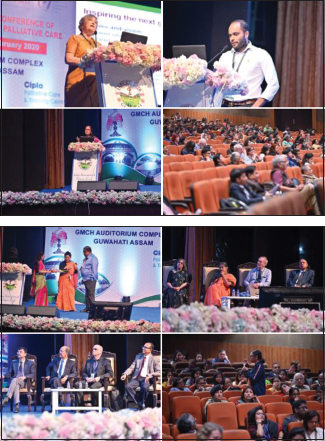
2nd plenary was presented by three speakers: Dr Nagesh Simha, Dr Roop Gursahani and Dr Ravi Kannan. Dr Simha and Dr Gursahani presented on ‘Changing governments, changing scenarios’ & ‘The bureaucratic opinion on Palliative care and End of Life care’ in a sequential manner. The deliberations focused on obstacles faced due to change in government scenarios and how this impacts palliative care service provision and delivery. Dr Gursahani depicted the private sector to bring out the differences in promoting end of life care in malignant as well as non-malignant conditions. Dr Ravi Kannan took the audience through his journey of creating cancer care in Cachar. The plenary was chaired by Dr Stephen Connor, Dr Amal Kataky, Dr Rajiv Pathni and Prof Alak Buragohain.
Parallel sessions
Day-1 parallel sessions were based on nine sub-themes: Paediatric palliative care, Universal access to palliative care, Care for caregivers, Joining hands with contemporaries, Safe use of opioids, Rehabilitation, Bereavement & palliative care, Nursing issues in palliative care, Palliative care in Non-malignant diseases, and New initiatives in Northeast palliative care. Dr Mary Ann conducted a special 1-hour session for NGO participation in palliative care.
Dr Lulu Mathews, Alice Stella, Dr Spandana Rayala, Dr Anjum Joad, Prof Julia Downing, Dr Jenifer Jeba, Dr Abhijit Dam, Prof David Oliviere, Dr Vivek Nirbhawane, Dr Sukdev Nayak, Dr Tara Rajendran, Mr K. M. Noordeen, Dr Arun Ghoshal, Prof Suresh Reddy, Dr Raghu Thota, K. V Ganpathy, Mr Radhakrishnan, Dr Rumana Dowla, Savita Luka, Monjula Hussain, Hanife MacGamwell, Dr Pritwish Bhattacharyya, Prof Frank Brennan, Dr Benzi Kluger, Dr Neelakshi Mahanta, Dr Karl Lorenz, Dr Vandana, Dr Jerine Liankimi, Dr Nepuni Athiko, and Dr Gayatri Gogoi were the main speakers.
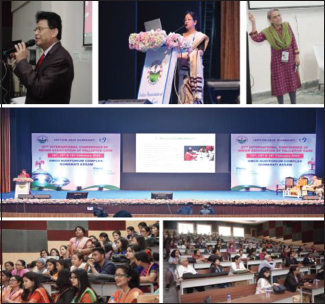
Spotlight
Day-1 spotlight was on the topics ‘Procedural pain protocol in children: How to avoid procedural pain’ presented by Dr Lulu Mathews and ‘Music therapy in palliative care’ presented by Dr Tara Rajendran. Dr Mathews presented the Procedural pain protocol developed first time in India by IPM, Calicut. She demonstrated the importance of managing procedural pain in children. Dr Tara Rajendran's music therapy showed the interconnectedness of music to relief of symptoms like anxiety in cancer and its therapeutic importance.
Inaugural function
IAPCON 2020 was formally inaugurated on February 14 by Srimati Krishna Gohain, IAS, Commissioner & Secretary, Health & Family Welfare, Government of Assam in a solemn function organized in the Gauhati Medical College Auditorium. The function was presided over by Dr Sushma Bhatnagar, President of IAPC in presence of the guest of honour, Prof Alak Burogohian, Ex Vice Chancellor of Dibrugarh University and other dignitaries. Padmashree Dr Ravi Kannan was felicitated for his contribution to Cancer Care in the function. The International Award for Excellence in Palliative Care by Cancer Aid Society were given for three categories this year: Doctors, Nurses and Social Workers. The award in the category of Doctors was given to Dr Navin Salins, Mrs Alice Stella in the category of nurses, and Mr K M Noordeen in the category of Social Worker. Mr Piyush Gupta and Mrs Neha Tripathi gave away the awards. The winner of 2019 Bruce David Gold Medal by IPM Calicut is Dr Angeline Yvette Mascarenhas. A cash prize of Rs 25000 was awarded to her by Dr Lulu Mathews on behalf of IPM Calicut. BRAHMAPUTRA – the souvenir brought out by the organizing committee to mark the occasion was formally released by the Chief Guest. The inauguration was followed by a grand cultural program.
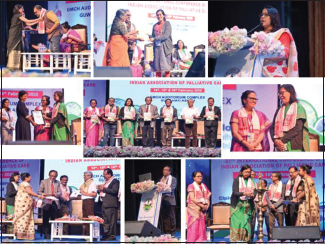
DAY-TWO ATTRACTIONS
Meet the expert
Two sub-themes were touched upon by experts in meet the expert session on Day-2: Topics on ‘Ethical perspectives in palliative care’ were presented by Dr Shoba Nair and Dr Jayita Deodhar, and ‘Opiod availability and NDPS Act implementation in India’ were presented by Dr Nandini Vallath and Dr Priti Sanghavi.
Plenary
Plenaries presented on Day-2 were: ‘Integration of palliative care in continuum of care’ and ‘Universal health coverage & Palliative care'. Citing the importance of integrating palliative care across care continuum, Dr Cynthia Goh depicted how palliative care improves outcomes in medicine. Dr Karl Lorenz spoke on ‘Measuring and evaluating pain in palliative care: a real-life challenge’ describing why managing pain is necessary at any point for any disease. He also stressed upon the numerous challenges encountered and how to overcome them in practical situations. The lectures were chaired by Dr Neelakshi Mahanta, Prof Suresh K Reddy, Dr Bibhuti Bhushan Borthakur and Dr Chidananda Bhuyan.
The plenary on sub-theme ‘Universal Health Coverage & palliative care’ had two topics: ‘Mapping levels of palliative care development’ presented by Dr Stephen R Connor and ‘Primary palliative care in Universal health coverage’ presented by Dr Daniel Munday. Dr Conner elaborated on WHPCA's palliative care mapping and pinpointed the fact that palliative care is still not reaching the levels required by half of the global population. Based on newly improved indicators for mapping palliative care, he showed that only 15% of the countries have achieved advanced integration representing only 14% of the global population.
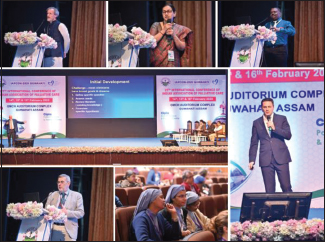
Dr Daniel Munday discussed the integration of primary palliative care in primary healthcare. He described the role of primary healthcare workers in early identification and triggering of palliative care as part of integrated and holistic chronic disease management, collaborating with specialist palliative care services where they exist, and strengthening underlying professional capabilities in primary care. He stressed that if palliative care is to be available to all, it must be provided in primary care integrated with health promotion, primary and secondary disease prevention, treatment and rehabilitation. He also described a possible model of integrated chronic disease management integrated with palliative care.
Dr Prakash Fernandez spoke on ‘Available educational courses in palliative care and career opportunities in India’ bringing out a list of ongoing courses in Palliative Medicine and Nursing and discussed on how these could be improved. The plenary was chaired by Dr Frank Ferris, Dr Mary Ann Muckaden and Dr Ajit Deka.
Panel discussion
A panel discussion was held on ‘Finding a solution to fulfil unmet needs of palliative care in India'. Moderated by Dr Anjum Khan Joad, the panelists were Dr Sushma Bhatnagar, Mr Radhakrishnan and Mr Noordeen. The discussion brought out the gaps in the present palliative care system in India and possible solutions to fulfil those gaps.
Parallel sessions
The sub-themes for parallel sessions on Day-2 were: Engaging students in palliative care, Role of volunteers and social workers, Models of Institute based palliative care in Assam, Improving competency, and Pain management. One of the topics ‘Experiences of a Student palliative care activist’ was presented by a team of student members from Students Association of Palliative Care, Kerala.
Dr Piyush Gupta, Dr Mohansundaram, Mrinmoyee Baruah, Dr Savita Butola, Dr Mary Ann Muckaden, Dr Kabindra Bhagabati, Dr Arun Deka, Dr Iqbal Bahar, Dr Sanghamitra Bora, Dr Biju Raghavan, Dr Jagjit S Dhaliwal, Sangeetha N, Dr Sandip Mukhopadhyay, Dr Raghavendra R, Dr Seema Mishra, Dr Anuja Damani, Dr Shoba Nair were the main speakers in the parallel sessions.
Spotlight
The spotlight on Day-2 was on ‘Spiritual Distress Scale’ presented by Dr Joris Gielen, Dr Sushma Bhatnagar, Komal Kashyap and Suraj Pal Singh. The team described the development of a new culturally specific Spiritual Distress scale for palliative care patients in India at AIIMS New Delhi. They also discussed its psychometric characteristics and showed how the scale can be used in palliative care research in India. The final scale was shown to contain 16 items on general existential issues (e.g. wondering why, fear of the future, loneliness, forgiveness) besides items of spiritual importance to palliative care patients in India (e.g. pain as punishment for sin, karma, puja).
DAY-THREE ATTRACTIONS
Parallel session
The proceedings of Day-3 started with two parallel sessions and one oral paper session. ‘Integration of Oncology with Palliative Care’ was presented by Dr Saurabh Joshi and ‘Physiotherapy in palliative care: Areas of practical applications’ was presented by Dr Sandeep Babbar. The sessions were chaired by Dr Pooja Chaudhury, Dr Iqbal Bahar and Dr Joydeep Purkayastha.
Plenary
The sub-theme for Day-3 plenary was ‘Palliative Care Research & Quality Improvement'. Three eminent speakers presented on: ‘Palliative Care research: Opportunities & Challenges’ and ‘Realizing quality improvement in palliative care setting'.
Stating that challenges are opportunities, Prof Frank D Ferris elaborated on ‘Palliative Care Research: Opportunities & Challenges’ and the different facets that are relevant to opportunities amidst challenges. He stressed that despite every step taken proactively during research, there remains one particular challenge that has the capacity to change the course of the outcome, and hence it is important to recognize this early and take necessary action to make this challenge into an opportunity.
Dr Nandini Vallath and Jake Mickelsen presented on ‘Realizing Quality improvement in palliative care setting’ described Quality improvement methods and their importance in creating and sustaining a palliative care program.
A special session ‘On a spiritual journey’ was conducted by Brahmakumaris that took the audience through a sojourn of spiritual realm amidst such excitement of the event. Dr Sukdev Nayak and Dr Priyanka Surana felicitated the Brahmakumari Team.
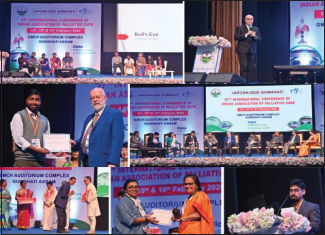
Multidisciplinary discussion
A multidisciplinary discussion was held on ‘The way forward for palliative care growth in the Northeast: Resources, Willingness & Inclusiveness'. The panel consisted of experts from various agencies who put forward their points that transpired into a common advisory for palliative care group of the North east. The panelists were: Dr Frank D Ferris from Ohio, Dr Suresh K Reddy from MD Anderson, Dr Nripen Barkataki from NHS UK, Dr Rajiv Pathni of Assam Cancer Care Foundation, Dr Achyut Kr Baishya, Executive Director of National Health Mission, Dr Alok Mathur, Additional Deputy Director General, Directorate General of Health Services, Ministry of Health and Family Welfare, Govt of India, Dr Dinesh Goswami from Guwahati, Dr N Subodha from Palliative Care Society Imphal, Dr Mary Ann Muckaden from TMH Mumbai, and Dr Sushma Bhatnagar from AIIMS New Delhi. The discussion was moderated by Dr Sanghamitra Bora.
Spotlight
The spotlight on Day-3 was on the topic ‘Lessons in International Palliative Care Collaboration: PA-PAICE’ presented by Dr Karleen Giannitrapanni, Dr Aanchal Satija and Dr Archana Ganesh. The team elaborated on the objective of the PC-PAICE initiative in India in which they partnered with seven diverse Indian palliative care sites to foster locally initiated improvement projects by training local teams on QI methods, matching teams with expert mentors, and holding teleconference collaboratives to create a shared learning environment. The results were shared in this session.
ORAL PRESENTATIONS
Out of 160 abstracts received, 48 were selected for oral presentation of which three were chosen as the best:
-
3rd prize awarded to Manju BK for her paper on ‘Addressing spiritual and psychosocial needs of patients with advanced non-communicable diseases admitted to a general hospital in Nepal'
-
Dr Revathi Rajagopal won the 2nd prize for ‘Death Anxiety and its corelates among patients with advanced cancer: findings from a tertiary care center'
-
1st prize was awarded for ‘Palliative care needs assessment in patients suffering from advanced chronic obstructive pulmonary disease/Interstitial lung disease’ presented by Dr Puneet Rathore.
The judges for oral papers were: Dr Shoba Nair, Dr Dinesh Goswami, Dr Anupam Das, Dr Mary Ann Muckaden, Dr Biju Raghavan, Dr Raghavendra, KV Ganpathy, Dr Abhijit Dam, Dr Sukdev Nayak, Dr Joris Gielen, Dr Mohansundaram, Dr Priyam Saikia, Dr Savita Butola, Dr Karleen Giannitrapanni, Dr Megha Pruthi, Dr Anjum Joad, and Dr Vandana Sinha. We are grateful to our judges for taking up this important task.
POSTER PRESENTATIONS
104 posters were displayed over the first two days of the conference. The judges had a tough time judging the papers as they were all of good academic quality. Our panel of judges – Dr Raghavendra, Dr Sumita Mohanty, Dr Seema Mishra, Dr Frank Ferris, Dr Biju Raghavan and Dr Nagesh Simha, selected the following prize-winning posters:
-
Sravannthi Maya won the 1st prize for her poster on ‘Construction and face validation of a Cancer Coping questionnaire (Can Cope)'
-
Akanksha Bansal won the 2nd prize for her poster on ‘Multimodal approach to management of neuropathic pain in emergency room – role of intravenous lignocaine and magnesium sulphate'
-
Bethsheba Eisher won the 3rd prize for her poster on ‘Building community palliative-informed care for the vulnerable in tribal villages of Odhisha Highlands, India'.
DEBATE AND PALLIATIVE CARE QUIZ
A lively and exciting debate on ‘Implementation of Advance directives in India is highly practical’ took the audience's attention and shook them to the core. Dr Bhavesh Pangaria won the debate speaking in favour of the topic. Dr Sushma Bhatnagar, Dr Cynthia Goh and Prof Frank Ferris judged the debate.
Another attraction that literally stole the show was the Palliative care quiz conducted by Dr Arunangshu Ghoshal, K V Ganpathy, Dr Anuja Damani and Dr Kahkasha. The West zone team led by Dr Nandini Vallath were the winners and Dr Anjum Khan's North Zone were the runners up.
CONCLUSION
IAPCON 2020 was a huge success despite the challenges faced by the organizing committee. The scientific sessions were highly appreciated by delegates both from India and abroad. It was successful in achieving the objectives that were kept in mind while conceiving the sessions. The organizing committee deeply appreciates the help extended by Cipla Palliative Care & Training Center, IAPC, Assam Cancer Care Foundation, State Cancer Institute, Gauhati Medical College and B Barooah Cancer Institute. The committee also acknowledges the support from Ministry of Health, Government of Assam, NGOs, Personalities, and all those who supported throughout the event.
Going forward
Team IAPCON 2020 extends their best wishes to Dr Umesh Bhadani and his team for a successful IAPCON 2021 in Patna.





